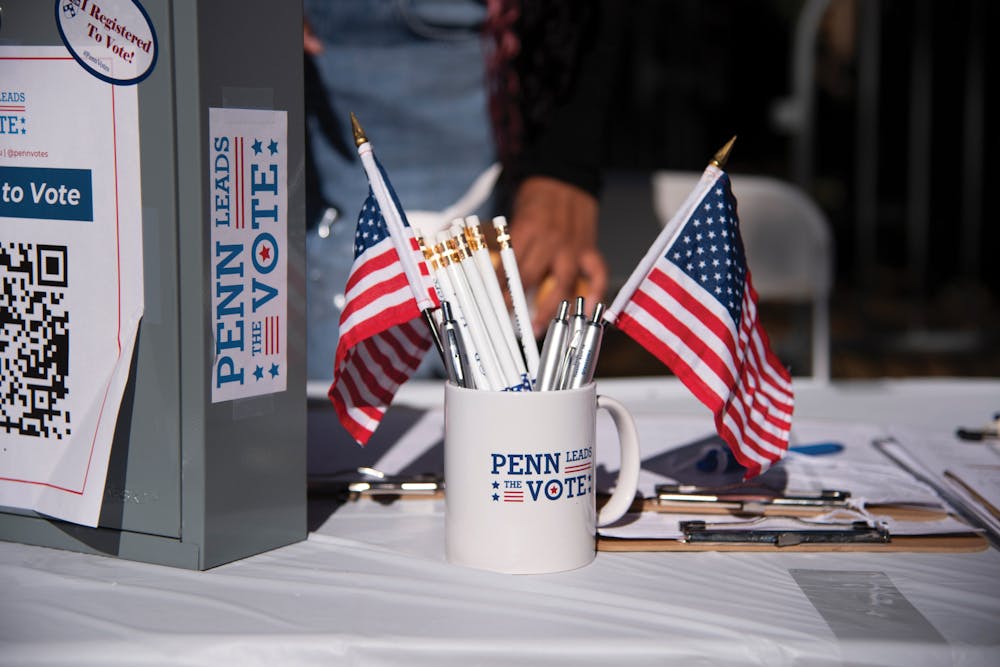
On-campus partisan political student groups have reported an increasing difficulty in registering events amid Penn’s move to limit University statements on political events.
Penn College Republicans and Penn Democrats, the University’s largest partisan political organizations, told The Daily Pennsylvanian that they have faced difficulties registering events on campus. Penn’s temporary open expression guidelines, which were implemented over the summer, have increased requirements for registering events — even as Penn’s recently adopted policies to move the University toward institutional neutrality are intended to decrease involvement in political affairs.
In response to a request for comment, a University spokesperson wrote to the DP that "[t]he rules about hosting political candidates on campus have not changed."
"As a 501(c) non-profit organization, we have always had to abide by IRS regulations preventing the University from supporting, or appearing to support, political candidates," the spokesperson added continued.
In a statement to the DP, a College Republicans spokesperson said that the club has faced difficulties in scheduling venues to host events, and that the University has denied its requests due to a lack of room for potential protesters to demonstrate.
“On multiple occasions, we have gone to great lengths to host events that align with the values of open debate and intellectual diversity,” the spokesperson wrote. “With the support of some non-profits, we offered to cover all costs only to be denied access to spaces for reasons that, in our view, seem contrived.”
The spokesperson cited a recent instance in which the club attempted to bring a candidate for United States senator for an open question and answer session.
“Our experiences demonstrate a troubling pattern where our attempts to host diverse, conservative speakers — intended to foster dialogue, open discussions, and provide students with a wider array of perspectives — have been obstructed by University policies and selective bureaucratic barriers,” they wrote.
College Republicans recently hosted a fireside chat with U.S. Senate candidate Dave McCormick, who is a Republican, off campus at Two Locals Brewing on Oct. 23.
Similarly, Penn Dems has also reported hurdles in booking events this semester.
According to the group, it was denied a campus room for a phone bank, and University attorneys directed the club to take “unnatural steps” to make a speaking event nonpartisan.
“While we may understand the University’s policies, we hope they don't interfere with Penn Dems’ mission and our work to increase the political engagement of Penn students,” a Penn Dems spokesperson wrote in a statement to the DP.
On the other hand, Penn Leads the Vote, a nonpartisan, student-run organization that aims to foster a culture of civic engagement on Penn’s campus, told the DP that it has not experienced any issues organizing events.
“This could be due [to] PLTV’s status as a nonpartisan organization, but, overall, we’ve been really happy with the level of engagement and support we’ve received from faculty, students, and the Penn community as a whole as the election approaches!” a spokesperson for the group wrote to the DP.
After pro-Palestinian activism and the establishment of Penn’s Gaza Solidarity Encampment during the 2023-24 academic year, the University instituted a set of temporary open expression guidelines, which contained guidance on “when, where, and how open expression can take place.” On Sept. 10, Interim Penn President Larry Jameson also announced guidelines that limit the University from making public statements on political issues or events that do not directly impact the University.
The Temporary Standards and Procedures for Campus Events and Demonstrations, which were instituted over the summer and are still in effect, outline new requirements for demonstrations, including mandatory reservations for outdoor spaces two weeks in advance, prior approval for events during business hours, and a prohibition on overnight occupations.
The guidelines — though intended to clarify protest policies — contain ambiguities, loopholes, and contradictions, according to a DP analysis. The guidelines explicitly ban encampments and expand the authority of the vice provost for University Life, but vague definitions and unclear restrictions raise questions about their ability to be enforced and consistency with Penn’s longstanding open expression commitments.
The new guidelines make it more difficult for groups — including student organizations — to organize on campus. According to a series of interviews with Penn faculty members, organizers of the Palestine Writes Literature Festival would face significant obstacles if they were to return to Penn due to stricter rules on event planning and campus access.
In particular, these guidelines limit attendance by default to Penn community members and restrict the presence of unaffiliated individuals, making large-scale events, specifically those involving external speakers or open attendance, more difficult to organize.
“We advocate for an environment where a broad spectrum of views can be heard and evaluated by students,” the College Republicans spokesperson wrote. “Open, peaceful exchanges should not be dismissed due to ideological differences, especially at an institution dedicated to education and intellectual growth.”
The Daily Pennsylvanian is an independent, student-run newspaper. Please consider making a donation to support the coverage that shapes the University. Your generosity ensures a future of strong journalism at Penn.
Donate






